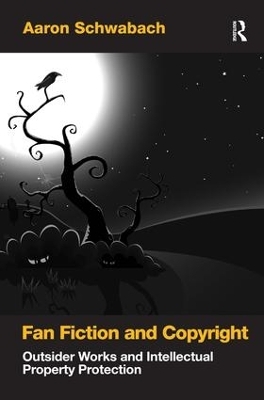
Fan Fiction and Copyright
Outsider Works and Intellectual Property Protection
Seiten
2011
Routledge (Verlag)
978-0-7546-7903-5 (ISBN)
Routledge (Verlag)
978-0-7546-7903-5 (ISBN)
Fan fiction - stories and novels written by fans of existing characters, and shared mainly on the internet - has long been a nearly invisible form of outsider art. This book examines the various types of fan-created content, and asks whether and to what extent they can be protected as transformative uses.
As long as there have been fans, there has been fan fiction. There seems to be a fundamental human need to tell additional stories about the characters after the book, series, play or movie is over. But developments in information technology and copyright law have put these fan stories at risk of collision with the content owners’ intellectual property rights. Fan fiction has long been a nearly invisible form of outsider art, but over the past decade it has grown exponentially in volume and in legal importance. Because of its nature, authorship, and underground status, fan fiction stands at an intersection of key issues regarding property, sexuality, and gender. In Fan Fiction and Copyright, author Aaron Schwabach examines various types of fan-created content and asks whether and to what extent they are protected from liability for copyright infringement. Professor Schwabach discusses examples of original and fan works from a wide range of media, genres, and cultures. From Sherlock Holmes to Harry Potter, fictional characters, their authors, and their fans are sympathetically yet realistically assessed. Fan Fiction and Copyright looks closely at examples of three categories of disputes between authors and their fans: Disputes over the fans’ use of copyrighted characters, disputes over online publication of fiction resembling copyright work, and in the case of J.K. Rowling and a fansite webmaster, a dispute over the compiling of a reference work detailing an author's fictional universe. Offering more thorough coverage of many such controversies than has ever been available elsewhere, and discussing fan works from the United States, Brazil, China, India, Russia, and elsewhere, Fan Fiction and Copyright advances the understanding of fan fiction as transformative use and points the way toward a safe harbor for fan fiction.
As long as there have been fans, there has been fan fiction. There seems to be a fundamental human need to tell additional stories about the characters after the book, series, play or movie is over. But developments in information technology and copyright law have put these fan stories at risk of collision with the content owners’ intellectual property rights. Fan fiction has long been a nearly invisible form of outsider art, but over the past decade it has grown exponentially in volume and in legal importance. Because of its nature, authorship, and underground status, fan fiction stands at an intersection of key issues regarding property, sexuality, and gender. In Fan Fiction and Copyright, author Aaron Schwabach examines various types of fan-created content and asks whether and to what extent they are protected from liability for copyright infringement. Professor Schwabach discusses examples of original and fan works from a wide range of media, genres, and cultures. From Sherlock Holmes to Harry Potter, fictional characters, their authors, and their fans are sympathetically yet realistically assessed. Fan Fiction and Copyright looks closely at examples of three categories of disputes between authors and their fans: Disputes over the fans’ use of copyrighted characters, disputes over online publication of fiction resembling copyright work, and in the case of J.K. Rowling and a fansite webmaster, a dispute over the compiling of a reference work detailing an author's fictional universe. Offering more thorough coverage of many such controversies than has ever been available elsewhere, and discussing fan works from the United States, Brazil, China, India, Russia, and elsewhere, Fan Fiction and Copyright advances the understanding of fan fiction as transformative use and points the way toward a safe harbor for fan fiction.
Aaron Schwabach is Professor of Law at the Thomas Jefferson School of Law, where he teaches subjects including internet law. His previous books include Intellectual Property: A Reference Handbook (ABC-CLIO, 2007) and Internet and the Law: Technology, Society, and Compromises (ABC-CLIO, 2005).
Introduction: Who Owns Fandom?; Chapter 1 The World of Fan Fiction; Chapter 2 The First Question: Are the Underlying Works or Characters Protected?; Chapter 3 The Second Question: If the Underlying Works or Characters are Protected, does the Fan Work Infringe upon that Protection?; Chapter 4 Three Interests of the Author in Conflict with Fanfic; Chapter 5 Fanfic: The New Voyages;
| Erscheint lt. Verlag | 5.7.2011 |
|---|---|
| Verlagsort | London |
| Sprache | englisch |
| Maße | 156 x 234 mm |
| Gewicht | 476 g |
| Themenwelt | Geisteswissenschaften ► Geschichte |
| Geisteswissenschaften ► Sprach- / Literaturwissenschaft ► Anglistik / Amerikanistik | |
| Recht / Steuern ► Allgemeines / Lexika | |
| Recht / Steuern ► Arbeits- / Sozialrecht ► Sozialrecht | |
| Recht / Steuern ► EU / Internationales Recht | |
| Recht / Steuern ► Wirtschaftsrecht ► Urheberrecht | |
| Sozialwissenschaften ► Soziologie ► Spezielle Soziologien | |
| ISBN-10 | 0-7546-7903-9 / 0754679039 |
| ISBN-13 | 978-0-7546-7903-5 / 9780754679035 |
| Zustand | Neuware |
| Haben Sie eine Frage zum Produkt? |
Mehr entdecken
aus dem Bereich
aus dem Bereich
Poetik eines sozialen Urteils
Buch | Hardcover (2023)
De Gruyter (Verlag)
59,95 €
Entzauberung und Faszination des Immergleichen in Literatur und Film
Buch | Softcover (2024)
Springer Fachmedien Wiesbaden GmbH (Verlag)
84,99 €
Buch | Softcover (2024)
belleville (Verlag)
20,00 €


